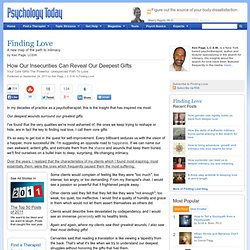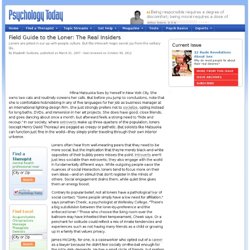

Should You Fall in Love With a Shy Person? What a Pretty Face Can’t Tell You. Just what, exactly, can we learn from a pretty face?

Because despite axiomatic warnings to the contrary, when we meet other people we spend an awful lot of time judging books by their covers. Encounter someone attractive, and it’s hard for us to look away . But it’s even more difficult for us to refrain from drawing bigger-picture conclusions about what type of person we think we're dealing with. 10 Common Passive Aggressive Phrases to Avoid. Is there someone in your life who consistently makes you feel like you are on an emotional roller coaster?

Batman Unmasked - The Psychology of the Dark Knight [Documentary] The Vanishing Self. Evolution of the Self. Introverted? Shy? How the World Misperceives Us. Photo by Greg at the St. Louis Zoo As a child, I was very introverted and quite shy . I had friends, but generally preferred spending time with one or two of them at a time. When in large groups such as Cub Scouts or less-structured social events, I generally felt out of place. I remained on the periphery and honed my observation skills. 6 Clues to Character. Seconds after Tamara was ushered into his office, Michael knew she was right for the creative staff of the advertising team he ran.
Within a year, they were not only a productive duo professionally, they were dating. She soon jumped to another agency largely so they could live together openly. A year later, they were married and enacting their plan to start a boutique agency together. Business grew comfortably although not spectacularly—until the recession hit.
Having observed from a master how to initiate client contact, Tamara went into overdrive. The harder she worked, the more Michael's praise got under Tamara's skin; she grew to hate being viewed as indefatigable. How Your Greatest Insecurities Reveal Your Deepest Gifts. In my decades of practice as a psychotherapist, this is the insight that has inspired me most: Our deepest wounds surround our greatest gifts.

I've found that the very qualities we're most ashamed of, the ones we keep trying to reshape or hide, are in fact the key to finding real love. I call them core gifts. It's so easy to get lost in the quest for self-improvement. What Are the 10 Top Words That Reveal Who You Are? What Matters to You and Why? If you want to truly connect with someone, talk about what matters...what really matters! Too often we interact with others (and make judgments about them as well) based on very superficial information such as appearances.
LonsdaleA_0509_sls.pdf (objeto application/pdf) Altered Ego. Lauren had been in one committed romantic relationship after another since age 16. It seemed simpler to negotiate life in tandem with a boyfriend, who could listen to her stories, stand as a buffer against her family, and supply emotional support in a steady, easy way. She thought of herself as skilled at relationships but weak in areas like self-reliance, independence, and simply being alone, and at first she was OK with it. The Power of Introverts: A Manifesto for Quiet Brilliance. Do you enjoy having time to yourself, but always feel a little guilty about it?

Then Susan Cain’s “Quiet : The Power of Introverts” is for you. It’s part book, part manifesto. We live in a nation that values its extroverts – the outgoing, the lovers of crowds – but not the quiet types who change the world. She recently answered questions from Mind Matters editor Gareth Cook. The Secret Joys of Introverts. Miina Matsuoka lives by herself in New York City.

She owns two cats and routinely screens her calls. But before you jump to conclusions, note that she is comfortable hobnobbing in any of five languages for her job as business manager at an international lighting-design firm. She just strongly prefers not to socialize , opting instead for long baths, DVDs, and immersion in her art projects.
She does have good, close friends, and goes dancing about once a month, but afterward feels a strong need to "hide and recoup. " In our society, where extroverts make up three-quarters of the population, loners (except Henry David Thoreau) are pegged as creepy or pathetic. Loners often hear from well-meaning peers that they need to be more social, but the implication that they're merely black-and-white opposites of their bubbly peers misses the point. Gender Differences in Personality Are Larger than Previously Thought. A new study confirms that men's minds come from Mars and women's from Venus.

In an article recently published in the online journal PLoS ONE, Italian cognitive psychologist Marco Del Giudice and his collaborators compared the personality traits of men and women in a sample of over 10,000 people and found huge differences. Women scored much higher than in men in Sensitivity, Warmth, and Apprehension, while men scored higher than women in Emotional Stability, Dominance, Rule-Consciousness, and Vigilance. When many personality traits were considered simultaneously, there was only a 10% overlap between the distributions of these traits in men and women. Essentially, the study suggests that when it comes to personality men and women belong to two different species.